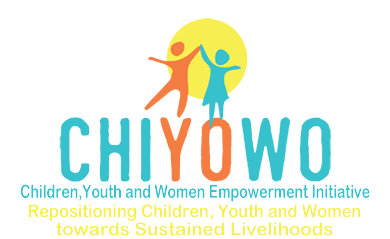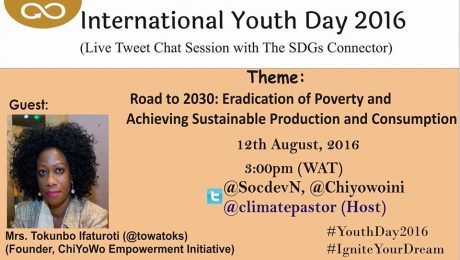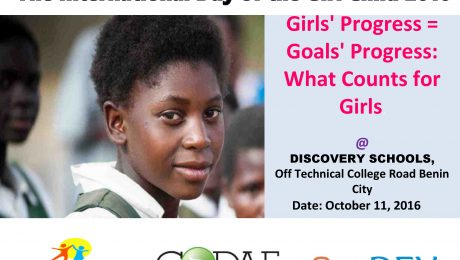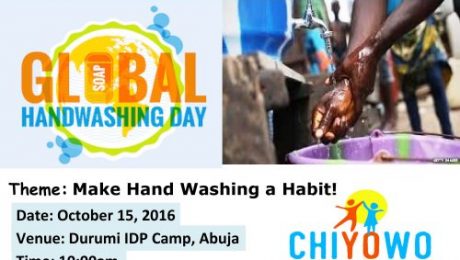Our Hope for 2017 and Beyond…
Our Hope for 2017 and Beyond
By ChiYoWo
With 2016 coming to a close it is time to start thinking about the New Year and the things we want to accomplish not only for ourselves but for our children, our youth, and our women all over the world.
The people of Nigeria, especially women and children have been struck by many hardships over the years and it is time for adversity to end. It is time to have access to education, for there to be gender equality, greater access to healthcare, and for everyone to equally have the opportunity to live a happy and prosperous life.
There are many people and organizations all over the world that are making what once was a dream, a reality. Organizations such as ONE, The Nigerian Health Watch, Health Reform Foundation of Nigeria, Afri-Dev, WARDC and partners are calling on the Government of Nigeria to:
- Allocate dedicated resources to benefit all Nigerian women and girls, particularly in the poorest and the most vulnerable areas.
- Step up funding for nutrition in the 2017 budget in line with the national nutrition strategy.
- Provide additional funding of 1% of CRF promised for the Basic Care Provision Fund within the National Health Act and to do so within the 2017 budget. A call has been made to set a timetable to achieve the Abuja Declaration commitment to allocate at least 15% of the annual budget to health by the end of the term of this government in 2019.
- Ensure that states allocate the 15% to the health budget and data is made available on health budgets allocated and implemented at both the state and federal levels, to facilitate accountability to citizens.
This New Year brings new hope to the children youth and women in Nigeria. There are people listening, raising awareness, and working hard to ensure that lives and situations change for the better. It is time to make a difference.
Related Research:
ONE – https://www.one.org/africa/press/make-naija-stronger-health-campaign-launched/
- Published in ARTICLES
Youth Empowerment Twitter ‘Live’ Talk on Sustainable Development Goals
- Published in Events
The Saga of Malnutrition in Internally Displaced Camps
Malnutrition in Children in Internally Displaced Camps
In 2009 Boko Haram attacked Maiduguri the capital of Borno state and carried out a series of attacks on police stations and government buildings which led to confrontation, chaos and bloodshed on the streets. Hundreds of Boko Haram supporters were killed, and thousands of residents fled the capital.
Seven years later, this conflict is still on-going with no sign of abating any time soon. Over 15 million people affected by this conflict and within Nigeria’s borders more than 1.8 million people have been forcibly displaced. Alarmingly, 7.4 million people are in need of humanitarian assistance, with more than 50 percent being children.
These children, who are already living in precarious situations and poverty, are left with nothing. Right now, there are a quarter of a million children left severely malnourished. Malnutrition is defined as “lack of proper nutrition, caused by not having enough to eat, not eating enough of the right things, or being unable to use the food that one does eat.”
The largest attributing factor to children being malnourished is the lack of access to nutritious foods in these camps. Children are in need of an array of assorted vitamins, minerals, and micro-nutrients and without the proper type of food malnutrition occurs. When a child becomes malnourished, their body cannot even do the simplest of things such as continue to grow or fight off disease.
Currently, organizations like UNICEF, WFP, and OCHA are working hard to reach those severely malnourished children in these camps. The WFP plans on providing not only food but money as well to 1.8 million of the most vulnerable people while UNICEF is treating 133,000 severely malnourished children while providing healthcare to 3.3 million people.
There are also plans for the government to ramp up their efforts and establish an inter-ministerial response task force and appointing a Humanitarian Coordinator to liaise with the international community.
If you are looking to help these children in need there many organizations you can donate too. A few of them would be:
[1.] Vanguard – http://www.vanguardngr.com/2016/02/450-children-died-of-malnutrition-in-28-idp-camps-in-borno/ [2.] UNICEF – https://www.unicef.org/appeals/files/UNICEF_NorthEast_Nigeria_Snapshot_5_Feb__2015.pdf [3.] World Food Program – https://www.wfp.org/hunger/malnutrition [4.] UNICEF – https://www.unicef.org/appeals/nigeria.html#1 [5.] Humanitarian Response – https://www.humanitarianresponse.info/en/operations/nigeria/documents/document-type/humanitarian-programme-cycle [6.] UN OCHA – http://www.unocha.org/nigeria/about-ocha-nigeria/about-crisis
https://unocha.exposure.co/when-conflicts-starve-children
[7.] BBC News – http://www.bbc.com/news/world-africa-13809501
- Published in BLOG
International Day of the Girl Child in Benin, Nigeria
ChiYoWo Celebrates International Day of the Girl Child 2016 in Benin, Nigeria
Children, Youth and Women (ChiYoWo) Empowerment Initiative organized a one-day seminar to commemorate the international Day of Girl Child on 11th of October, 2016 at Discovery Schools, Benin City, Nigeria. The theme of this year’s event, “Girls’ Progress = Goals’ Progress: A Global Girl Data Movement, is a call for action for increased investment in collecting and analyzing girl-focused, girl-relevant and sex-disaggregated data, as what gets counted gets done. The Day increases awareness of issues and inequalities faced by girls around the world. To date, many global development plans do not include or consider girls, and their issues and problems become “invisible.”
The seminar helped raise awareness not only of the issues that girls face but also what is likely to happen when those problems are resolved. For instance, educating girls helps reduce the rate of child marriages, disease and helps strengthen the economy by enabling girls have access to higher paying jobs.
Onyeka Titigbe of ChiYoWo Empowerment Initiative and facilitator of the Girl Child event noted the objective of the seminar, was to empower the participants to be better leaders in the society. This was borne from the fact that the rate of girl child abuse, kidnappings and gender based violence in the society caused by culture, hunger and poverty, inadequate government policies and insurgency had been placed on the back burner for too long.
At the event Mrs. Rita Iyke-Uwaka, a forest and biodiversity officer of Environmental Rights Action/Friends of the Earth, Nigeria, emphasized on the need for immediate action to protect the girl child and stressed educating the girl child would help to reduce dependency on others and to a large extent, help lift families out of poverty. In addition, Mr. Cadmus Enade, from the Health of Mother Earth Foundation, urged them to maintain their dignity as girls, while Mrs. Caroline Ubrei Joe stated every girl has the potential of giving birth to a generation, not just a generation but generation of impact. She also spoke on how to achieve their career goals and advised them not to be distracted by irrelevant events.
In closing the event, Chiyowo Empowerment Initiative donated a total of ten (10) copies of Ben Carson’s life changing books “Gifted Hands” and “Think Big” to 10 students who were encouraged to read and learn from the books.
ChiYoWo Empowerment Initiative is a non-profit organisation seeking to Reposition Children, Youth and Women towards Sustained Livelihoods.
- Published in Events
ChiYoWo Rehabilitates Water Borehole for Internally Displaced Persons in Abuja, Nigeria
ChiYoWo Empowerment Initiative Rehabilitates Abandon Water Borehole For Internally Displaced Persons in Abuja, Nigeria
On 15th October 2016, ChiYoWo Empowerment Initiative marked the Global Handwashing Day by repairing and restoring a disused water borehole at the Internally Displaced Persons Camp in Durumi, Abuja, Nigeria. ChiYoWo which is an acronym of Children, Youth and Women focused attention on the importance of water, sanitation and hygiene and the significance of washing hands after going to the toilet, playing outside, farming, selling goods and produce, working and more.
According to Globalhandwashing.org every year, 1.7 billion children do not live to celebrate their 5th birthday because of diarrhea and pneumonia. Three quarters of these children are located in Sub-Saharan Africa and South Asia. This Project was based on the Day’s theme ‘Make Handwashing a Habit’. ChiYoWo empowered mostly women and children on the most effective way to prevent such diseases, by providing them with sustainable water and informing them of the importance of using soap when washing hands.
We are proud to say the host community and most especially over 300 women and 400 children living in Durumi IDP Camp now have access to clean water, which will be used for cooking, bathing, farming and their general well-being. According to the Chairlady of the IDP Camp whom we spoke with 2 weeks later, “every day women and our young girls pray for you when they go to fetch water from the borehole, because water is the most important thing women need in their lives”.
ChiYoWo Empowerment Initiative is a non-profit organisation seeking to Reposition Children, Youth and Women towards Sustained Livelihoods.
- Published in Events



